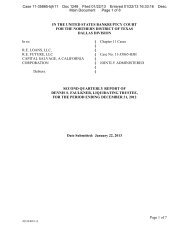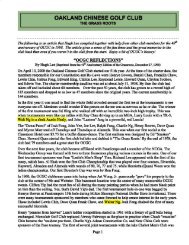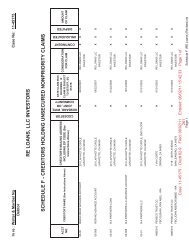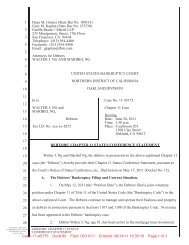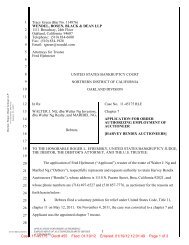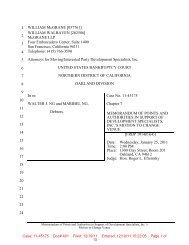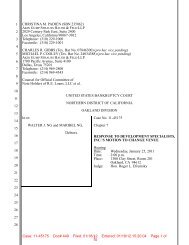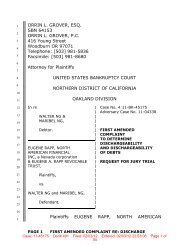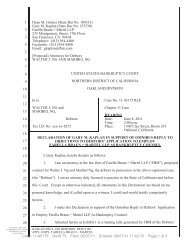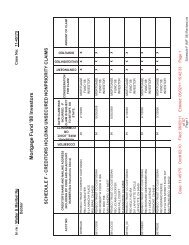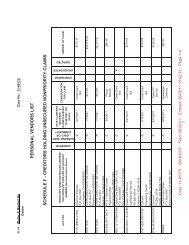Class Plaintiff's Response to Automatic Stay - equitatus
Class Plaintiff's Response to Automatic Stay - equitatus
Class Plaintiff's Response to Automatic Stay - equitatus
You also want an ePaper? Increase the reach of your titles
YUMPU automatically turns print PDFs into web optimized ePapers that Google loves.
Case 11-03620-bjh Doc 40 Filed 02/21/12 Entered 02/21/12 23:34:41 Desc Main<br />
Document Page 7 of 34<br />
INTRODUCTION<br />
1. Greenberg Traurig, LLP (“Greenberg”) is not entitled <strong>to</strong> any of the relief it seeks in this<br />
Adversary Proceeding. Greenberg has no concern for the Deb<strong>to</strong>r or the administration of this<br />
Chapter 11 bankruptcy. Its request for stay protection is nothing but a thinly-veiled and flimsy effort<br />
<strong>to</strong> avoid, minimize or postpone liability it faces in the California state proceedings for its own<br />
wrongdoing. Greenberg’s motion is completely at odds with the purposes of the Bankruptcy Code,<br />
which exists <strong>to</strong> protect the Deb<strong>to</strong>r, not Greenberg. The Deb<strong>to</strong>r does not see the need for the so-called<br />
“protection” Greenberg claims is so important, and neither should this Court.<br />
2. Greenberg’s argument that class plaintiffs are asserting claims of the estate is meritless. The<br />
California class plaintiffs unquestionably own the claims they assert in the California class action.<br />
Each claim alleges breaches of duties owed directly <strong>to</strong> the RE Loans inves<strong>to</strong>rs, not <strong>to</strong> RE Loans itself.<br />
Each claim alleges direct and individual harm <strong>to</strong> the inves<strong>to</strong>rs, not RE Loans. Because these claims<br />
do not belong <strong>to</strong> the estate, they are not stayed under § 362(a)(3).<br />
3. Greenberg’s request that the stay be extended <strong>to</strong> prevent harm <strong>to</strong> the estate confuses and<br />
ultimately fails <strong>to</strong> apply the proper standards required <strong>to</strong> enjoin third party litigation pursuant <strong>to</strong> §§<br />
362 and 105. A stay is not au<strong>to</strong>matic and may be granted only in unusual circumstances, after a<br />
traditional analysis of the merits of injunctive relief. Greenberg cannot show that any of the<br />
necessary fac<strong>to</strong>rs are met here. It utterly fails <strong>to</strong> demonstrate that allowing the California class<br />
litigation <strong>to</strong> proceed will irreparably harm the reorganization. Its argument <strong>to</strong> this effect is largely<br />
based on factually-unsupported speculation. Moreover, neither §§ 362 nor 105 could possibly be<br />
utilized <strong>to</strong> move the state court claims here for resolution.<br />
4. The California class litigation is critical <strong>to</strong> the RE Loans inves<strong>to</strong>rs injured by Greenberg’s<br />
illegal conduct. The state law claims allege that Greenberg committed a number of acts, including<br />
common law and securities fraud, that directly and individually harmed inves<strong>to</strong>rs in RE Loans and<br />
Mortgage Fund ’08 (“MF08”). Greenberg, acting in concert with Wells Fargo Foothill, LLC, (“Wells<br />
Fargo”) stripped the inves<strong>to</strong>rs of valuable membership rights and compromised the security of their<br />
investments. Many of the inves<strong>to</strong>rs lost their entire retirement funds, and others lost their life<br />
1



